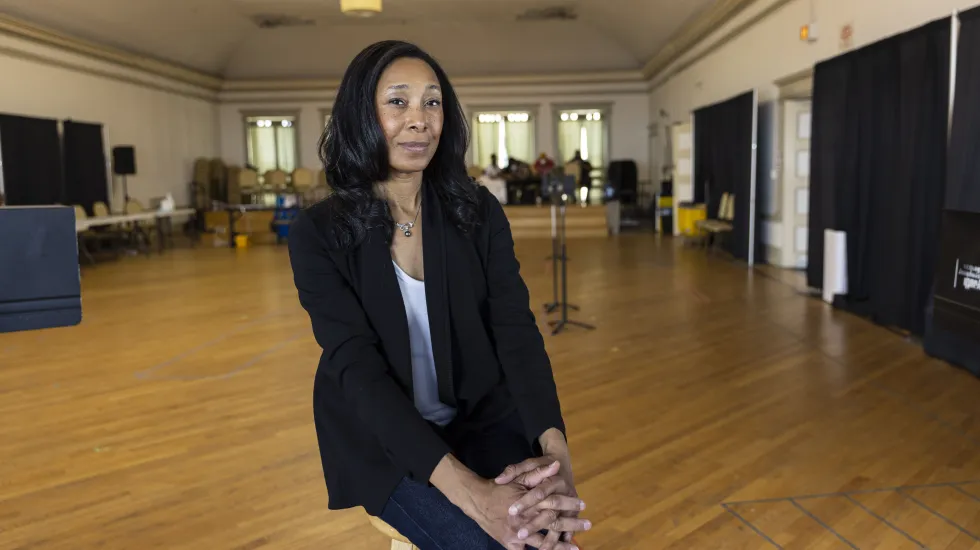
History is never fully complete. Even the best-researched events from the past can still provide some fascinating surprises.
That is certainly the case with a forgotten aspect of America’s Revolutionary War that underlies a new opera, titled “Quamino’s Map.” Chicago Opera Theater will present its world premiere during performances April 23, 29 and May 21 at the Studebaker Theater.
The work presents a fictionalized story related to the thousands of Black Americans who fought in the war for the British in return for their freedom and then settled in London and struggled to carve out lives for themselves.
Chicago Opera Theater — ‘Quamino’s Map’
When: 7:30 p.m. April 23 and 29; 3 p.m. May 1
Where: Studebaker Theater, Fine Arts Building, 410 S. Michigan
Tickets: $45-$150
Info: chicagooperatheater.org
Belizean-born composer Errollyn Wallen learned of this historical episode in 2000 while reading S.I. Martin’s “Incomparable World: A Novel,” which looks at the imagined lives of three of these exiles in 18th-century England.
“It explores different types of Black experience in London in a very vivid time,” Wallen said. “I vowed then that I would one day bring that to the stage.”
Two decades later, when Chicago Opera Theater commissioned an opera from the British-based composer and paired her with American librettist Deborah Brevoort, the notion of basing an opera on that book bubbled back to the surface after several other ideas proved infeasible.
The result is a loose adaptation of Martin’s novel that tells the story of Juba Freeman (tenor Curtis Bannister), a formerly enslaved man who arrives in London after fighting for the British and meets Amelia Alumond (soprano Flora Hawk), a member of the British Black gentry.
Although Brevoort’s libretto borrows essential historical context from the book, most of it is original with a condensed plot more suited to this sung form. “I read the novel. Loved the novel. But I didn’t think it was an opera,” she said.
Many of the characters are invented but a few are taken from or are inspired by history, including the title figure: Quamino Dolly (bass-baritone Damien Geter). He was an older enslaved man from the Carolinas who worked as a spy and tracker for the British and later relocated to London.
“The opera is really about freedom and the human desire for freedom,” Brevoort said. “And every character in the opera is pursuing freedom in some way, including people in the gentry. Because it’s such a deeply held, burning desire, that felt operatic to me.”
Bannister has appeared with the Chicago Opera Theater previously, but Freeman is his first leading role. He finds the character, who arrives in London expecting a promised war pension that does not materialize, realistic and relatable.

“There are many people in the United States and all over,” he said, “that have optimism about what something is going to be and then either because of circumstances beyond their control or missteps they took, things aren’t what they seem or as they were promised.”
“Quamino’s Map” is Wallen’s 22nd opera. Although some are quite small scale, it is nonetheless a staggering number considering Beethoven wrote just one work in the form, and some composers never manage more than a handful. One of the best known of her creations in the form is “Dido’s Ghost” (2021), which has been featured at the prestigious Edinburgh International Festival in Scotland and is set for its American premiere in 2023.
“I sing, myself,” she said. “I grew up surrounded by singing and I studied dance, so I have an affinity for the theater.”
For this opera, set in the 18th century, she makes references to the past, with a couple of sections incorporating a harpsichord and harking back to a Mozartean aesthetic. But the work has a contemporary feel at the same time, with tinges of the blues and other styles along the way.
“The score is in a way a mélange,” Wallen said, “but driven by the characters and how I wanted to portray them.”

“Quamino’s Map” conductor Jeri Lynne Johnson, founder of the Black Pearl Chamber Orchestra in Philadelphia, praised Wallen for her ability to create a distinctive sound world for each location in the opera, including London’s then red-light district, and her skills as a tunesmith. “She really has a knack for writing very singable melodies,” Johnson said.
With the rise of the Black Lives Matter movement and the accelerated attention to issues of race and gender that have ensued, Wallen believes the classical world today is more open and receptive to works like “Quamino’s Map.”
“There has always been diversity,” she said, “but let’s just say that diversity has not always been brought to the fore. People like me have always been here. I feel there is an openness and a willingness now to hear different sources of voices, which wouldn’t have been the case in classical music even five or 10 years ago.”






